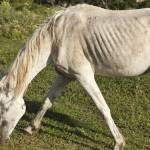Management of Thin Older Horses

Though many older horses sustain good body condition and health on normal maintenance rations, other horses may lose weight, especially in severe weather, by the time they reach about 20 years old.
Bryan Waldridge, D.V.M., M.S., advises that the thin senior horse should be given a thorough physical examination, especially with regard to its teeth. Correctable dental abnormalities (sharp points, hooks, broken or infected molars) should be amended. Because most of these horses do not have much tooth growth left, overcorrection or aggressive floating should be avoided if possible.
After a veterinary inspection, the next step should be to thoroughly evaluate what the horse is being fed, determine if there have been any recent changes in diet or environment, and check the deworming history. Merely changing the horse to a better quality feed or hay will frequently solve the problem. Changes in environment can be particularly stressful to aged horses. Competition from new herdmates or loss of a herd companion can result in reduced intake and weight loss. Old horses are more sensitive to extremes of weather than are younger horses, regardless of body condition. Geriatric horses should have adequate shelter, though confinement to a stall can exacerbate orthopedic problems and stiffness. Intestinal parasitism may reduce digestive capabilities due to chronic mucosal damage and scarring.
Before instituting dietary changes, owners should ask a veterinarian to rule out medical causes of weight loss such as disease, kidney dysfunction, or liver failure. Chronic laminitis or infections, abnormal glucose or insulin levels following a glucose challenge, excessive thirst and urination, and a long, nonshedding hair coat are suggestive of pituitary dysfunction (equine Cushing’s disease), which is extremely common in geriatric horses. Horses showing these signs can be tested for the disease, and medication can be started if necessary.
Diagnosing and treating health problems are important steps in managing thin older horses. Some dietary modification, such as upgrading hay quality and switching to a feed designed for senior horses, may also be helpful.








